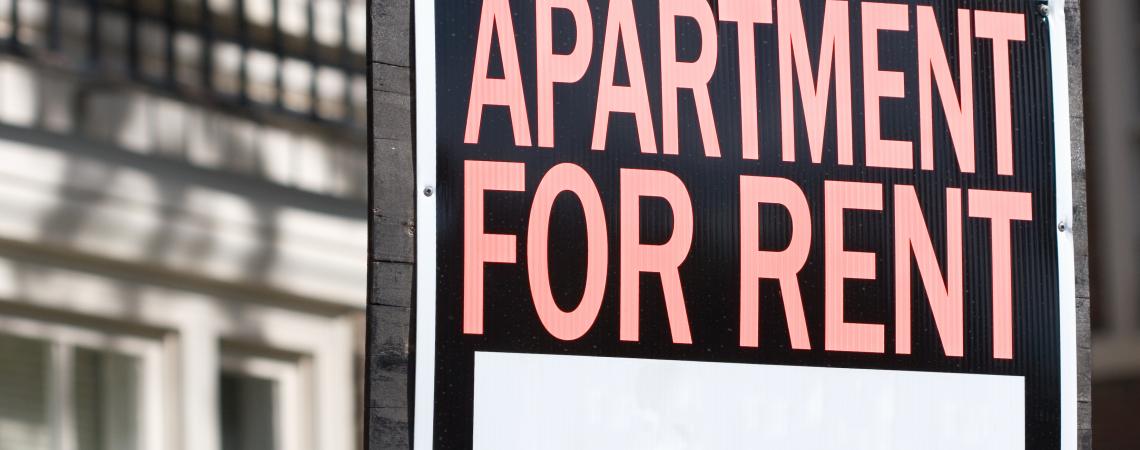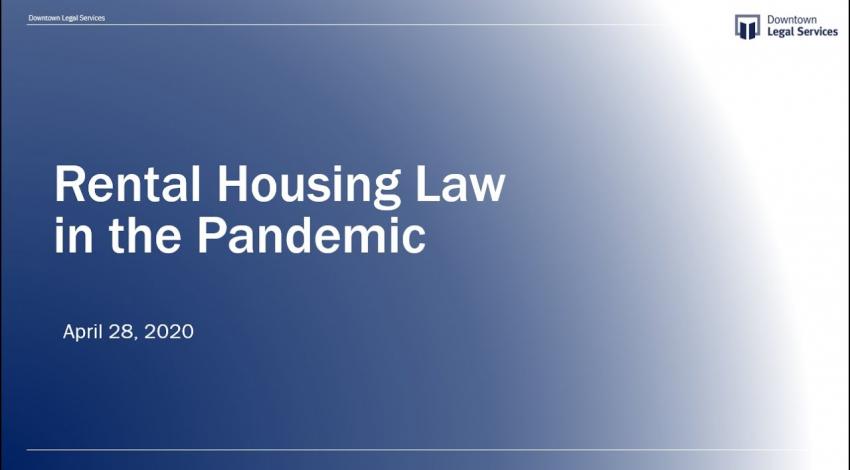A place to call home
Helping protect tenant rights
Nexus/Spring 2022
by Nina Haikara
The Universal Declaration of Human Rights recognizes the importance of housing as a fundamental human right under international law. Cities in Europe have advocated for a housing first policy, providing long-term housing of homeless individuals, as a necessary first step in eradicating homelessness.
“Our federal government, for example, has recognized the right to housing in legislation. But we don't necessarily see the level of public investment to match,” says Downtown Legal Services staff lawyer and alumnus Benjamin Ries (JD 2009, LLM 2011). “The reality on the ground is that it's difficult to persuade local decision makers that they should really devote much more of a city budget to keep putting people in homes as opposed to hotels, which are only temporary.”
Before law school, second year student Grayson Alabiso-Cahill, was a volunteer with the Federation of Metro Tenants' Associations (FMTA). It authored the FMTA report, “Taking Back our Housing,” which offers concrete proposals for how municipal expropriation powers could be used to significantly increase the supply of affordable and not-for-profit housing in the City of Toronto.
“As a matter of policy, why do we think housing is best suited as an asset – a financial tool – not a social tool?” says Alabiso-Cahill.
“I came to law school to do work in support of the working class. It's an amazing opportunity to do that work, to see the impact and consider how our clients can exercise their rights and advance their interests. It has been immensely rewarding and incredibly humbling. I feel like I've grown a lot too. I recommend Downtown Legal Services highly to everyone.”
Ries, who has directed the DLS Housing Division for more than seven years, has expertise in the international right to housing, poverty in Ontario, social assistance, landlord and tenant relations, rent and housing affordability, quality and repair of rental housing, and legal ethics when working with marginalized populations.
“I started the JD program in the fall of 2006. I remember going to a club fair, and that’s how I got recruited to volunteer at DLS,” says Ries.
“Like many other students have said over the years, I found DLS to be a comfortable home within the faculty. The cases you read from a century ago in England are not always easy to imagine. But tenant issues were immediate and relatable.”
By the third-year of the program, Ries was a full-time credit student in the Housing Law Division.
“At that time, a building landlord right around the corner from DLS was trying to make the tenants pay for their hydro when hydro was included in the lease. I took it on, and we ended up representing roughly 70 tenants in that building, in an application that went to the Landlord and Tenant Board.”
Through his time working at DLS, Ries made connections with other lawyers in the legal aid system. He completed his articling with the Ministry of Municipal Affairs and Housing and worked in legal aid in Hamilton and Toronto, before returning to DLS as supervising lawyer in 2014.
While most of the Housing Division’s work leads to the Landlord and Tenant Board (LTB), the division has taken on cases that go to small claims court and other forums. In a case where a father and daughter were subjected to landlord abuse and harassment, DLS helped them win one of the largest compensation awards ever granted in a housing discrimination case at the Human Rights Tribunal of Ontario (HRTO).
“That was a case that brought the concept of a ‘poisoned environment’ from the employment context over to the housing context, in way that hadn't been spelled out in the case law before.”
More commonly, DLS is approached for help with own-use evictions and ‘renovictions’ – cases where a landlord evicts a current tenant so that members of the owner's or purchaser's family can live there, or so the landlord can perform extensive work – in which tenants often suspect the landlord is acting in bad faith.
“It’s hard to disprove what somebody promises they’re going to do in the future. Students are a good match for these kinds of cases. Practicing things like cross examinations and gathering evidence. It’s really a trial-and-error process that you start poking around at the landlord story.”
Matt Malott (JD 2016) says the focus on client outcomes was good training for future practice.
“Ben was obviously guiding us through the whole thing, but he also gives students the space to figure the answers out for themselves,” he says. “In housing, there is a lot less appeal to precedent because LTB decisions are not legally binding. You must think on your feet and work through what the legislation says. DLS is great for learning that kind of lawyering technique because nothing else – no other class I took in law school – really prepared me for that.”
Malott has continued working in the clinic system, completing his articling at the HIV & AIDS Legal Clinic Ontario (HALCO), a specialty clinic serving clients across Ontario who are HIV positive. Since passing the bar, he’s worked as a staff lawyer at Legal Aid Ontario (LAO).
“Getting experience with housing was very useful because it’s quite rare, when I talk to clients today, that they couldn’t also benefit from some housing advice.”
He adds DLS was an important step on the ladder to a public service career.
“Before I came to law school, I was an academic. I really enjoyed teaching. But I really wanted to help people. Being part of the clinic system and LAO gives you the same opportunity to use your education to help people who would otherwise be at the mercy of a legal system that feels very inaccessible to the average person, a system that can be extremely frightening, frustrating, and disorienting.
“It’s great to know the work I do makes a difference to people.”
Joseph Galinsky (JD 2022) completed his degree in paralegal studies at Humber College, one of two such programs in Canada.
"When I was going into the paralegal degree program, I wanted to experience the everyday legal problems that people run into – that's really where paralegals excel. When we talk about small claims court, housing law, or human rights issues – these are the areas that paralegals can practice in and are able to provide affordable legal services.”
Galinsky, who wrote his licensing exam and worked for sole practitioners and with other paralegals over two years, says he was motivated to advance to a JD program and expand the scope of his practice. He joined the housing division at DLS as a summer student and stayed on as a course credit student and case leader to help mentor other students.
“DLS opened me to the struggles people go through in finding housing. A lot of people coming to us had problems getting a lease because they don’t have a co-signer who lives in Canada, with a Canadian bank account. We see this type of discrimination – people who likely have the funds, but are being treated differently than those Canadian students who have access to a parent who can co-sign their lease.
“Right away, we see this access to justice issue where people who might not be well-versed in the law are filling out multiple documents, and potentially interviewing with landlords, before they are accepted as a tenant.”
His next step after graduating this spring will be to join a firm in New York City where he can continue pro bono work.
“There’s an emphasis placed on giving back to the community. Some of those cases will be housing law issues and so that’s going to be really interesting for me, seeing how the Ontario Residential Tenancy Act compares to housing law in New York.”
Ries says there are over a dozen community clinics providing housing law services in Toronto alone, but the demand remains strong.
“We try to proactively get cases through referral from other agencies and other clinics. We do community organizing where we educate people about their rights and sign up tenants in the same building who are experiencing the same issue. This helps us reach a little bit deeper into benefiting whole neighborhoods and communities.”
Through the summer and fall of 2000, DLS fought to have the moratorium on evictions extended, litigating at the Superior Court of Justice and Court of Appeal for Ontario in Ontario v Persons Unknown – a different and more urgent type of case than any the housing division had done before.
By early 2021, the provincial government restored a moratorium on residential evictions during the height of the pandemic's second wave, less than two months after convincing a judge to end the Persons Unknown case that had sought the same result. While Ries speculates their litigation may have had little direct impact on the government’s later extension, DLS is proud to have coordinated efforts with housing lawyers from community clinics across the province to keep the issue of pandemic evictions in the public spotlight and maintain pressure on government and public health officials.
Hannah Bourgeois (JD 2022) was a student caseworker who conducted research and prepared court records for a motion in the case.
“I am so grateful for the opportunity to work on this file and at DLS because I was able to witness and engage in the passion and teamwork that is integral to public legal advocacy in practice. Studying law develops very specific skills that enable us to not only navigate but to help shape the legal system for the better over the long term ,” says Bourgeois.
Read Ries’ Globe and Mail op-ed: Everyone should remain in their homes – including those who can’t afford to pay rent
Ries says the growing wealth inequality in the city isn’t new, but many of the current laws and property systems in Toronto is premised on the idea that almost everyone is in the same boat.
“It’s easy for policymakers to have a particular type of middle-class voter, or upper-middle class homeowner, in mind. And the further apart that spread is in terms of income, access to family wealth, and so on, means having one set of laws for everyone becomes difficult to maintain.”
For example, Ries says the city’s park encampments grew out of the shelter system not being safe during COVID, and tenants being evicted for rent arrears particularly due to job losses in sectors hit hardest by the pandemic. Continued increases in asking rents on the private market — and a lack of new investment in social and supportive housing — have made homelessness harder to escape than ever before.
“Practical options available for our clients have changed and are continuing to change in a way that it doesn't seem good,” says Ries. “Over the past few years, we've watched law students at the clinic start to say, ‘Maybe I’m a long-term tenant, too.’”
Ries says the new reality is that students are identifying with the housing crisis their clients are facing in a way they never have before.
“As the market becomes more hostile for future homebuyers, students, U of T employees, even professors have rental issues that are relevant to our work. I could not have imagined that 10 years ago.”
Nina Haikara is a writer and communications strategist with the Faculty of Law.

